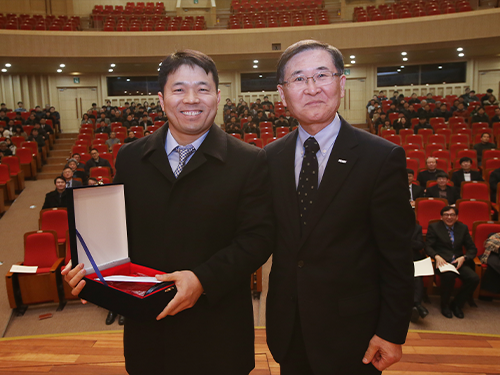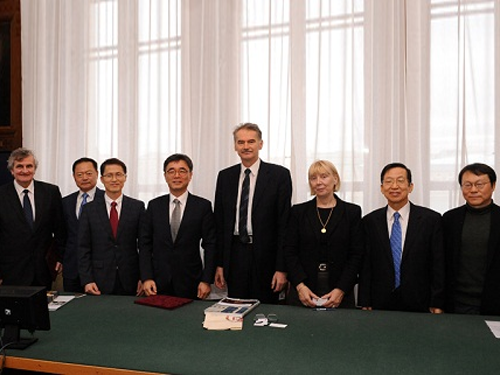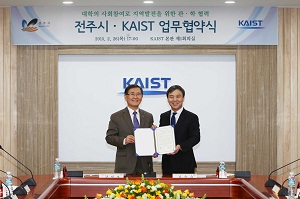Sung-Mo+Kang
-
 KAISTian of the Year 2016: Professor Hee-Sung Park
Professor Hee-Sung Park of the Department of Chemistry has been named the KAISTian of 2016. President Sung-Mo Kang awarded him at the New Year ceremony on January 2, 2017.
The KAISTian of the Year recognizes the most outstanding professor whose research and scholarship made significant achievements for the year. The Selection Committee announced that Professor Park was chosen as the 16th awardee in recognition of his developing new methods to incorporate unnatural amino acids into proteins.
Earning his Ph.D. in chemical engineering at KAIST in 2000, Professor Park has been a professor at KAIST since 2009. His research focuses on the production of synthetic proteins and the generation of diverse protein functions as well as the designing and engineering of new translation machinery for genetic code expansion, and the application of synthetic biology techniques for basic cell biology and applied medical science.
He developed a tool to engineer designer proteins via diverse chemical modifications, providing a novel platform for investigating numerous diseases such as cancer and dementia. Post-translational modifications (PTMs) are constantly taking place during or after protein biosynthesis. PTMs play a vital role in expanding protein functional diversity and, as a result, critically affect numerous biological processes. Abnormal PTMs have been known to trigger various diseases including cancer and dementia. Therefore, this technology, that enables proteins to reproduce with specific modifications at selected residues, will significantly help establish experimental strategies to investigate fundamental biological mechanisms including the development of targeted cancer therapies.
Professor Park’s research results appeared in the September 28, 2016 edition of Science. For more on Professor Park's research, please visit:
http://kaistcompass.kaist.ac.kr/?issues=fall-2016&magazine=a-chemical-biology-route-to-site-specific-authentic-protein-modifications
http://science.sciencemag.org/content/early/2016/09/28/science.aah4428
http://www.kaist.ac.kr/html/en/news/podcast.html (Podcast: Season 6 Episode 7: When good proteins go bad )
2017.01.10 View 9427
KAISTian of the Year 2016: Professor Hee-Sung Park
Professor Hee-Sung Park of the Department of Chemistry has been named the KAISTian of 2016. President Sung-Mo Kang awarded him at the New Year ceremony on January 2, 2017.
The KAISTian of the Year recognizes the most outstanding professor whose research and scholarship made significant achievements for the year. The Selection Committee announced that Professor Park was chosen as the 16th awardee in recognition of his developing new methods to incorporate unnatural amino acids into proteins.
Earning his Ph.D. in chemical engineering at KAIST in 2000, Professor Park has been a professor at KAIST since 2009. His research focuses on the production of synthetic proteins and the generation of diverse protein functions as well as the designing and engineering of new translation machinery for genetic code expansion, and the application of synthetic biology techniques for basic cell biology and applied medical science.
He developed a tool to engineer designer proteins via diverse chemical modifications, providing a novel platform for investigating numerous diseases such as cancer and dementia. Post-translational modifications (PTMs) are constantly taking place during or after protein biosynthesis. PTMs play a vital role in expanding protein functional diversity and, as a result, critically affect numerous biological processes. Abnormal PTMs have been known to trigger various diseases including cancer and dementia. Therefore, this technology, that enables proteins to reproduce with specific modifications at selected residues, will significantly help establish experimental strategies to investigate fundamental biological mechanisms including the development of targeted cancer therapies.
Professor Park’s research results appeared in the September 28, 2016 edition of Science. For more on Professor Park's research, please visit:
http://kaistcompass.kaist.ac.kr/?issues=fall-2016&magazine=a-chemical-biology-route-to-site-specific-authentic-protein-modifications
http://science.sciencemag.org/content/early/2016/09/28/science.aah4428
http://www.kaist.ac.kr/html/en/news/podcast.html (Podcast: Season 6 Episode 7: When good proteins go bad )
2017.01.10 View 9427 -
 KAIST and the Budapest University of Technology and Economics Agree to Cooperate in Education and Research
KAIST and the Budapest University of Technology and Economics in Hungary extended their existing agreement for comprehensive cooperation in education and research, and signed a new memorandum of understanding (MOU) for student exchanges on October 19, 2016, at Budapest University.
The two universities will exchange faculty, researchers, and students for education and research collaboration, implement dual degree programs, conduct joint lectures and research projects, and share infrastructures and talent pools.
These agreements were part of the agenda for the 8th Meeting of the Korea and Hungary Science and Technology Joint Committee, which took place October 17-19, 2016, in Budapest.
President Sung-Mo Kang of KAIST, Associate Vice President Sung-Hyon Myaeng of the International Office, and Director General Won-Ho Choi of International Relations at the Ministry of Science, ICT and Future Planning of Korea were present at the MOU singing.
Associate Vice President Myaeng said:
“Traditionally, the Budapest University of Technology and Economics has been known for its strong base in the natural sciences. Combining this with KAIST’s excellence in engineering, the two universities will bring synergistic effects that will help further develop the schools as well as their host nations.”
“Finding partners to implement joint research projects sponsored by the European Union or establishing cooperative networks among future talents between the two countries through various student exchange programs can be a good starting point,” he added.
The Budapest University of Technology and Economics was created in 1782, and is one of the most prestigious universities in Hungary, having produced three Nobel Prize laureates. It has a highly-globalized campus, where one third of its student population is made up of international students, and offers lectures and research in English.
In addition, the Hungarian-Korean Technical Cooperation Center Foundation, established in 1992 and based in Budapest, hosted a seminar on science in Korea and Hungary on October 17, 2016. At the seminar, Korean and Hungarian participants discussed issues on the two nations’ science, technology, and strategies to drive innovation under the topic “The Technical Innovation-Importance of Startup Companies.”
Associate Vice President Sung-Hyon Myaeng of the International Office, KAIST, is pictured fourth from the left, and János Józsa, rector of the Budapest University of Technology and Economics, is fifth from the left.
2016.10.20 View 9109
KAIST and the Budapest University of Technology and Economics Agree to Cooperate in Education and Research
KAIST and the Budapest University of Technology and Economics in Hungary extended their existing agreement for comprehensive cooperation in education and research, and signed a new memorandum of understanding (MOU) for student exchanges on October 19, 2016, at Budapest University.
The two universities will exchange faculty, researchers, and students for education and research collaboration, implement dual degree programs, conduct joint lectures and research projects, and share infrastructures and talent pools.
These agreements were part of the agenda for the 8th Meeting of the Korea and Hungary Science and Technology Joint Committee, which took place October 17-19, 2016, in Budapest.
President Sung-Mo Kang of KAIST, Associate Vice President Sung-Hyon Myaeng of the International Office, and Director General Won-Ho Choi of International Relations at the Ministry of Science, ICT and Future Planning of Korea were present at the MOU singing.
Associate Vice President Myaeng said:
“Traditionally, the Budapest University of Technology and Economics has been known for its strong base in the natural sciences. Combining this with KAIST’s excellence in engineering, the two universities will bring synergistic effects that will help further develop the schools as well as their host nations.”
“Finding partners to implement joint research projects sponsored by the European Union or establishing cooperative networks among future talents between the two countries through various student exchange programs can be a good starting point,” he added.
The Budapest University of Technology and Economics was created in 1782, and is one of the most prestigious universities in Hungary, having produced three Nobel Prize laureates. It has a highly-globalized campus, where one third of its student population is made up of international students, and offers lectures and research in English.
In addition, the Hungarian-Korean Technical Cooperation Center Foundation, established in 1992 and based in Budapest, hosted a seminar on science in Korea and Hungary on October 17, 2016. At the seminar, Korean and Hungarian participants discussed issues on the two nations’ science, technology, and strategies to drive innovation under the topic “The Technical Innovation-Importance of Startup Companies.”
Associate Vice President Sung-Hyon Myaeng of the International Office, KAIST, is pictured fourth from the left, and János Józsa, rector of the Budapest University of Technology and Economics, is fifth from the left.
2016.10.20 View 9109 -
 KAIST Signs MOU with Jeonju City
KAIST signed a memorandum of understanding for the development of new industries based on convergence technology with the government of Jeonju City on February 26, 2015. Located in the south west portion of the Korean peninsula, Jeonju City is home to a rich historical and cultural heritage.
Taking advantage of its proximity to the university's campus, the city will cooperate with KAIST to develop the local economy through creating new industries and jobs. To that end, KAIST and Jeonju will foster carbon-based industry, 3D printing technology, the Internet of Things, and emerging technologies. The two organizations also hope this cooperation will produce highly educated manpower for research and development in the city and offer the city to conduct national research projects.
President Sung-Mo Kang and Mayor Seung-Soo Kim pose after signing in the picture below.
2015.02.26 View 9032
KAIST Signs MOU with Jeonju City
KAIST signed a memorandum of understanding for the development of new industries based on convergence technology with the government of Jeonju City on February 26, 2015. Located in the south west portion of the Korean peninsula, Jeonju City is home to a rich historical and cultural heritage.
Taking advantage of its proximity to the university's campus, the city will cooperate with KAIST to develop the local economy through creating new industries and jobs. To that end, KAIST and Jeonju will foster carbon-based industry, 3D printing technology, the Internet of Things, and emerging technologies. The two organizations also hope this cooperation will produce highly educated manpower for research and development in the city and offer the city to conduct national research projects.
President Sung-Mo Kang and Mayor Seung-Soo Kim pose after signing in the picture below.
2015.02.26 View 9032